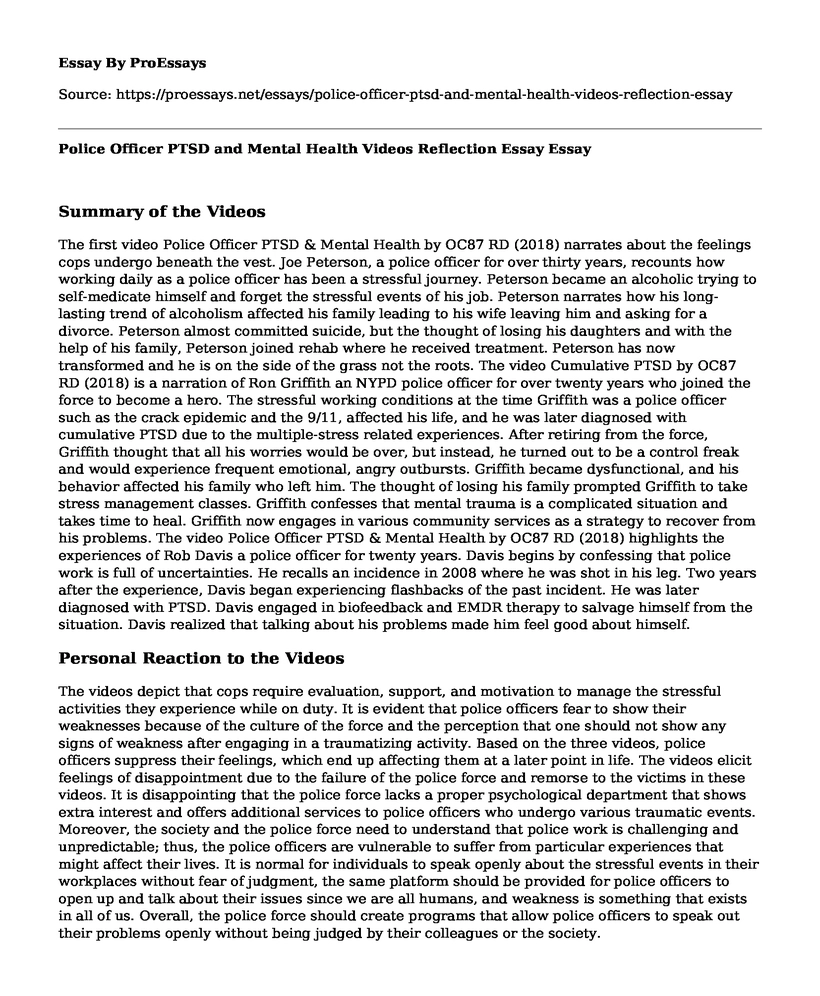Summary of the Videos
The first video Police Officer PTSD & Mental Health by OC87 RD (2018) narrates about the feelings cops undergo beneath the vest. Joe Peterson, a police officer for over thirty years, recounts how working daily as a police officer has been a stressful journey. Peterson became an alcoholic trying to self-medicate himself and forget the stressful events of his job. Peterson narrates how his long-lasting trend of alcoholism affected his family leading to his wife leaving him and asking for a divorce. Peterson almost committed suicide, but the thought of losing his daughters and with the help of his family, Peterson joined rehab where he received treatment. Peterson has now transformed and he is on the side of the grass not the roots. The video Cumulative PTSD by OC87 RD (2018) is a narration of Ron Griffith an NYPD police officer for over twenty years who joined the force to become a hero. The stressful working conditions at the time Griffith was a police officer such as the crack epidemic and the 9/11, affected his life, and he was later diagnosed with cumulative PTSD due to the multiple-stress related experiences. After retiring from the force, Griffith thought that all his worries would be over, but instead, he turned out to be a control freak and would experience frequent emotional, angry outbursts. Griffith became dysfunctional, and his behavior affected his family who left him. The thought of losing his family prompted Griffith to take stress management classes. Griffith confesses that mental trauma is a complicated situation and takes time to heal. Griffith now engages in various community services as a strategy to recover from his problems. The video Police Officer PTSD & Mental Health by OC87 RD (2018) highlights the experiences of Rob Davis a police officer for twenty years. Davis begins by confessing that police work is full of uncertainties. He recalls an incidence in 2008 where he was shot in his leg. Two years after the experience, Davis began experiencing flashbacks of the past incident. He was later diagnosed with PTSD. Davis engaged in biofeedback and EMDR therapy to salvage himself from the situation. Davis realized that talking about his problems made him feel good about himself.
Personal Reaction to the Videos
The videos depict that cops require evaluation, support, and motivation to manage the stressful activities they experience while on duty. It is evident that police officers fear to show their weaknesses because of the culture of the force and the perception that one should not show any signs of weakness after engaging in a traumatizing activity. Based on the three videos, police officers suppress their feelings, which end up affecting them at a later point in life. The videos elicit feelings of disappointment due to the failure of the police force and remorse to the victims in these videos. It is disappointing that the police force lacks a proper psychological department that shows extra interest and offers additional services to police officers who undergo various traumatic events. Moreover, the society and the police force need to understand that police work is challenging and unpredictable; thus, the police officers are vulnerable to suffer from particular experiences that might affect their lives. It is normal for individuals to speak openly about the stressful events in their workplaces without fear of judgment, the same platform should be provided for police officers to open up and talk about their issues since we are all humans, and weakness is something that exists in all of us. Overall, the police force should create programs that allow police officers to speak out their problems openly without being judged by their colleagues or the society.
References
OC87 RD (2018 a). Cumulative PTSD [Video File]. Retrieved from https://www.bing.com/videos/search?q=you+tube+beneath+the+vest%3a+cumulative+ptsd&view=detail&mid=0F45FFE6820EE30AD3500F45FFE6820EE30AD350&FORM=VIRE
OC87 RD (2018 b). Police officer PTSD & mental health [Video File]. Retrieved from https://www.youtube.com/watch?v=jOUziW6SwT4
OC87 RD (2018 c). Police officer PTSD & mental health [Video File]. Retrieved from https://www.youtube.com/watch?v=jOUziW6SwT4
Cite this page
Police Officer PTSD and Mental Health Videos Reflection Essay. (2022, Jun 19). Retrieved from https://proessays.net/essays/police-officer-ptsd-and-mental-health-videos-reflection-essay
If you are the original author of this essay and no longer wish to have it published on the ProEssays website, please click below to request its removal:
- How Police Response to Domestic Violence Evolved Over the Last Three Decades - Paper Example
- Real Estate Investment Paper Example
- Paper Example on Teacher Self-Awareness: Examining Strengths, Weaknesses & More
- Impact of Physical Appearance on Self-Esteem and Self-Worth - Research Paper
- Essay Sample on Mental Health Disorder: Causes, Statistics & Impact
- Essay Example on What Is Intelligence? Exploring Different Theories
- Psychosocial Assessment - Report Sample







